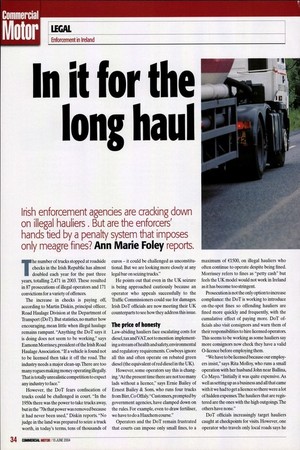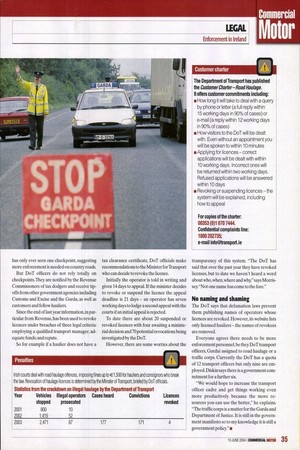n it for the
Page 28

Page 29

If you've noticed an error in this article please click here to report it so we can fix it.
1 ong haul
Irish enforcement agencies are cracking down on illegal hauliers. But are the enforcers' hands tied by a penalty system that imposes
only meagre fines? Ann Marie Foley reports.
The number of trucks stopped at roadside checks in the Irish Republic has almost doubled each year for the past three years, totalling 2,471 in 2003. These resulted in 87 prosecutions of illegal operators and 171 convictions for a variety of offences.
The number of trucks stopped at roadside checks in the Irish Republic has almost doubled each year for the past three years, totalling 2,471 in 2003. These resulted in 87 prosecutions of illegal operators and 171 convictions for a variety of offences.
The number of trucks stopped at roadside checks in the Irish Republic has almost doubled each year for the past three years, totalling 2,471 in 2003. These resulted in 87 prosecutions of illegal operators and 171 convictions for a variety of offences.
The increase in checks is paying off, according to Martin Diskin, principal officer, Road Haulage Division at the Department of Transport (DoT). But statistics, no matter how encouraging, mean little when illegal haulage remains rampant. "Anything the DoT says it is doing does not seem to be working," says Eamonn Morrissey, president of the Irish Road Haulage Association. "If a vehicle is found not to be licensed then take it off the road. The industry needs a major clean-up. There are too many rogues making money operating illegally. That is totally unrealistic competition to expect any industry to face." However, the DoT fears confiscation of trucks could be challenged in court. "In the 1950s there was the power to take trucks away, but in the '70s that power was removed because it had never been used," Diskin reports. "No judge in the land was prepared to seize a truck worth, in today's terms, tens of thousands of
euros — it could be challenged as unconstitutional. But we are looking more closely at any legal bar on seizing trucks."
He points out that even in the UK seizure is being approached cautiously because an operator who appeals successfully to the Traffic Commissioners could sue for damages. Irish DoT officials are now meeting their UK counterparts to see how they address this issue.
The price of honesty
Law-abiding hauliers face escalating costs for diesel, tax and VAT,not to mention implementing a stream of health and safety, environmental and regulatory requirements. Cowboys ignore all this and often operate on rebated green diesel (the equivalent of red diesel in the UK).
However, some operators say this is changing."At the present time there are not too many lads without a licence," says Ernie Bailey of Ernest Bailey & Sons, who runs four trucks from Birr, Co Offaly." Customers, prompted by government agencies, have clamped down on the rules. For example, even to draw fertiliser, we have to do a Hazchem course." Operators and the DoT remain frustrated that courts can impose only small fines, to a
maximum of €1500, on illegal hauliers who often continue to operate despite being fined. Morrissey refers to fines as "petty cash" but feels the UK model would not work in Ireland as it has become too stringent.
Prosecution is not the only option to increase compliance: the DoT is working to introduce on-the-spot fines so offending hauliers are fined more quickly and frequently, with the cumulative effect of paying more. DoT officials also visit consignors and warn them of their responsibilities to hire licensed operators. This seems to be working as some hauliers say more consignors now check they have a valid 0-licence before employing them.
"We have to be licensed because our employers insist," says Rita Molloy, who runs a small operation with her husband John near Ballina, Co Mayo. "Initially it was quite expensive. As well as setting up as a business and all that came with it we had to get a licence so there were a lot of hidden expenses. The hauliers that are registered are the ones with the high outgoings. The others have none." DoT officials increasingly target hauliers caught at checkpoints for visits. However, one operator who travels only local roads says he
has only ever seen one checkpoint, suggesting more enforcement is needed on country roads.
But DoT officers do not rely totally on checkpoints. They are notified by the Revenue Commissoners of tax dodgers and receive tipoffs from other government agencies including Customs and Excise and the Garda, as well as customers and fellow hauliers.
Since the end of last year information, in particular from Revenue, has been used to revoke licences under breaches of three legal criteria: employing a qualified transport manager; adequate funds; and repute. So for example if a haulier does not have a
tax clearance certificate, DoT officials make recommendations to the Minister for Transport who can decide to revoke the licence.
Initially the operator is told in writing and given 14 days to appeal. If the minister decides to revoke or suspend the licence the appeal deadline is 21 days — an operator has seven working days to lodge a second appeal with the courts if an initial appeal is rejected.
To date there are about 20 suspended or revoked licences with four awaiting a ministerial decision and 70 potential revocations being investigated by the DoT. However, there are some worries about the
transparency of this system. "The DoT has said that over the past year they have revoked licenses, but to date we haven't heard a word about who, when, where and why," says Morrissey. "Not one name has come to the fore."
No naming and shaming
The DoT says that defamation laws prevent them publishing names of operators whose licences are revoked. However, its website lists only licensed hauliers — the names of revokees are removed.
Everyone agrees there needs to be more enforcement personnel, be they DoT transport officers, Gardai assigned to road haulage or a traffic corps. Currently the DoT has a quota of 12 transport officers but only nine are employed. Diskin says there is a government commitment for a further six. "We would hope to increase the transport officer cadre and get things working even more productively because the more resources you can use the better," he explains. "The traffic corps is a matter for the Garda and Department of Justice. It is still in the government manifesto so to my knowledge it is still a government policy." •
























































































































































































